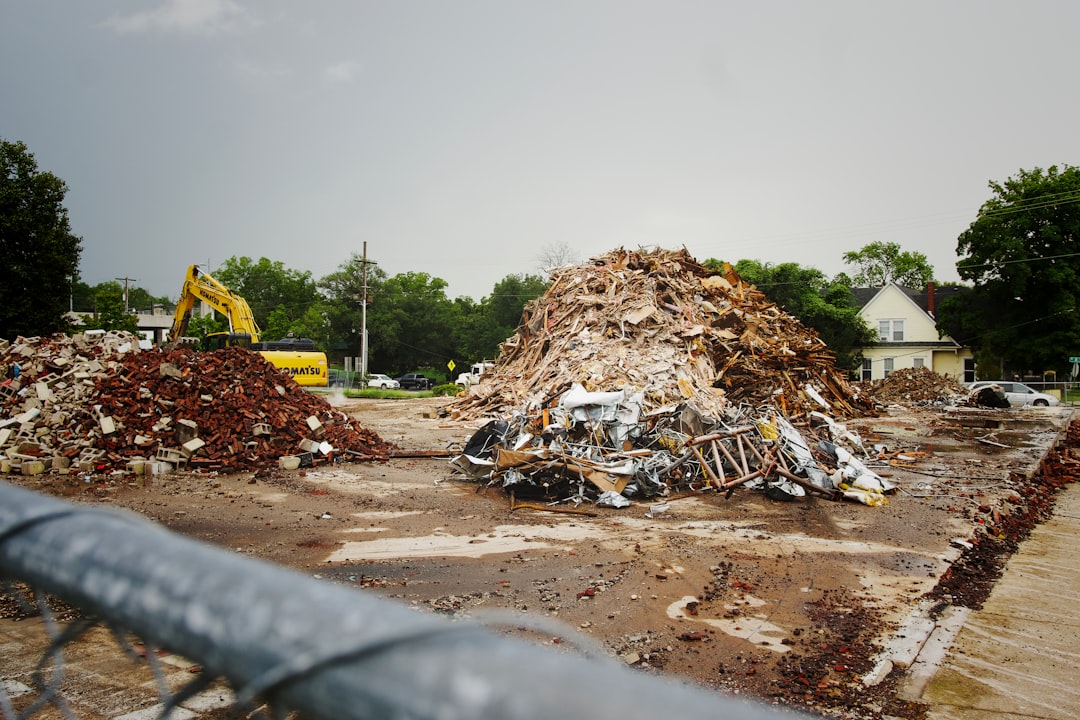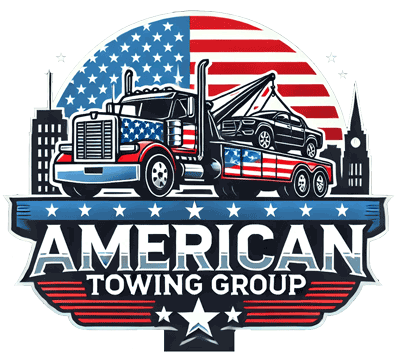Houston bulk trash: Master 2025 Pickup
Why Understanding Houston Bulk Trash Rules Matters
Houston bulk trash collection can seem complicated with its alternating monthly schedule and specific guidelines, but understanding the system saves property managers time and prevents costly mistakes.
Quick Houston Bulk Trash Guide:
- Bulk Waste Collection: Even months (February, April, June, August, October, December)
- Tree Waste Collection: Odd months (January, March, May, July, September, November)
- Volume Limit: 8 cubic yards maximum per collection
- Placement Window: Friday 6 PM before collection to 7 AM collection day
- Special Items: Up to 4 tires during Bulk Waste months only
- Appliances: Must have refrigerant removal certification tag
The City of Houston’s unique system divides waste into two categories with separate collection months. This alternating schedule helps the city recycle tree waste more effectively and keeps bulk items out of landfills.
For apartment complexes and rental properties, understanding these rules prevents resident complaints and keeps your property compliant. Missing collection windows or improper placement can leave unsightly piles that hurt your property’s image.
With over eight years of experience helping property managers steer Houston bulk trash requirements, we’ve gained deep insight into what works—and what causes problems—for apartment communities. This expertise in managing waste services across Houston allows us to help properties stay compliant and maintain their curb appeal.
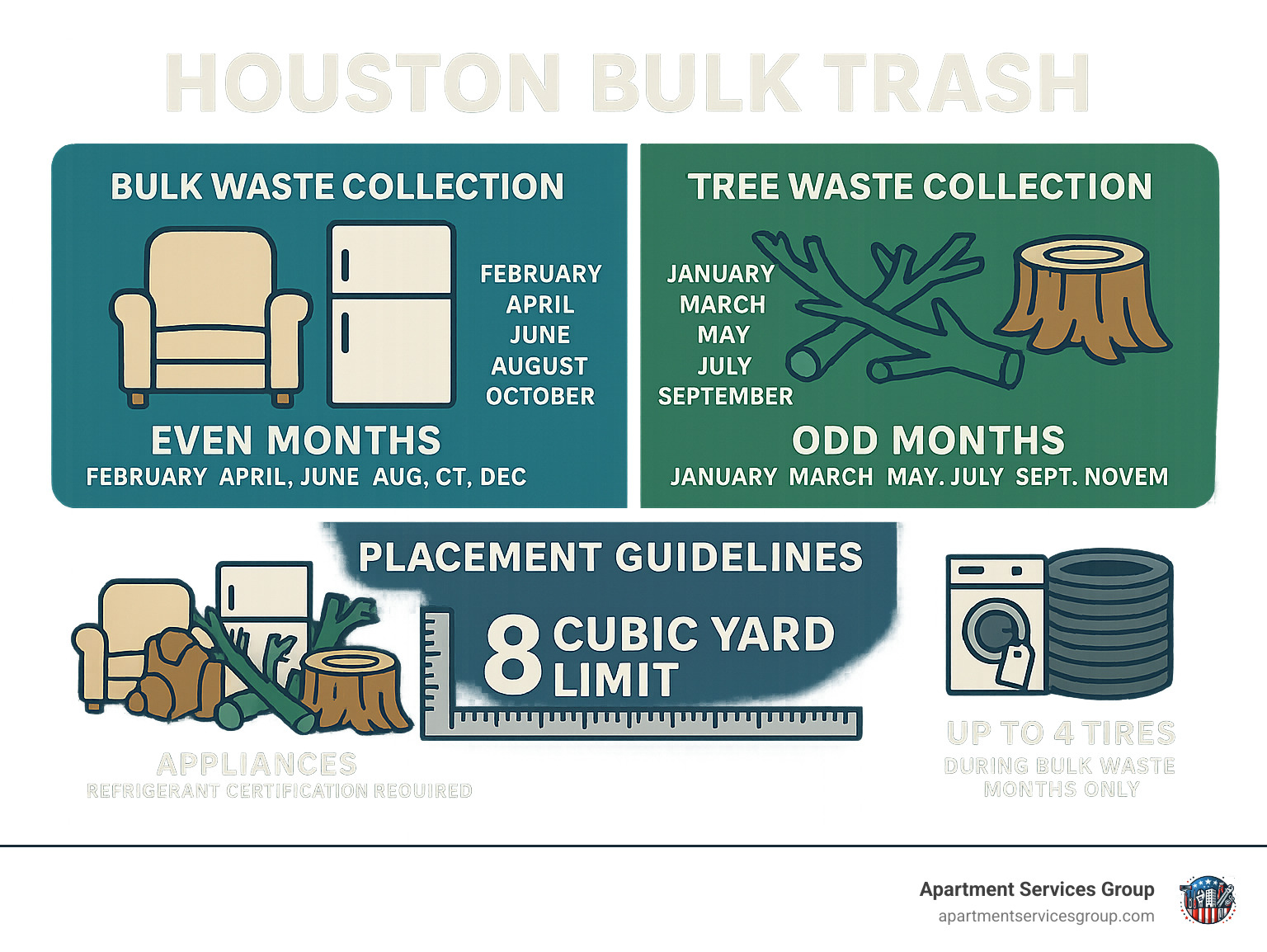
Understanding the City of Houston’s Curbside Collection Program
Houston’s bulk trash system might seem confusing at first, but it’s actually quite clever once you get the hang of it. The City of Houston’s Solid Waste Management Department designed this program with a specific purpose: to keep our neighborhoods clean while being smart about what goes where.
The heart of the system is an alternating schedule that separates different types of large items. This isn’t just bureaucracy for the sake of it – it’s actually a strategic way to divert materials from landfills and save taxpayer money. When you know what goes where and when, you’re helping Houston stay cleaner and greener.
What Qualifies as Houston Bulk Trash?
Houston bulk trash falls into two main categories, and understanding the difference will save you headaches down the road.
Bulk Waste items are those large household items that would never fit in your regular trash cart. We’re talking about furniture like old couches, dining tables, and dressers that have seen better days. Mattresses and box springs definitely qualify too – whether they’re twin-sized or king-sized monsters.
Appliances are also considered Bulk Waste, including washing machines, dryers, refrigerators, and even water heaters. Just remember that appliances with refrigerants need special preparation, which we’ll cover in detail later.
Tree Waste items are completely different. These are natural materials from your yard work – branches from pruning, stumps that meet the size requirements, and clean wood waste. The key word here is “clean.” This means natural, untreated wood only.
Here’s where people often get confused: just because something is made of wood doesn’t make it Tree Waste. That old wooden dresser? It’s Bulk Waste, not Tree Waste. Treated lumber from a construction project? Also not Tree Waste.
This separation matters because the city can recycle tree waste into mulch and compost instead of sending it to landfills. It’s a smart approach to landfill diversion that benefits everyone.
The Alternating Monthly Schedule: Bulk Waste vs. Tree Waste
The city runs on a simple alternating schedule that’s easy to remember once you get it down.
ODD numbered months – January, March, May, July, September, and November – are Tree Waste months. This is when you can put out branches, stumps, and other natural yard debris.
EVEN numbered months – February, April, June, August, October, and December – are Bulk Waste months. These are your furniture and appliance months.
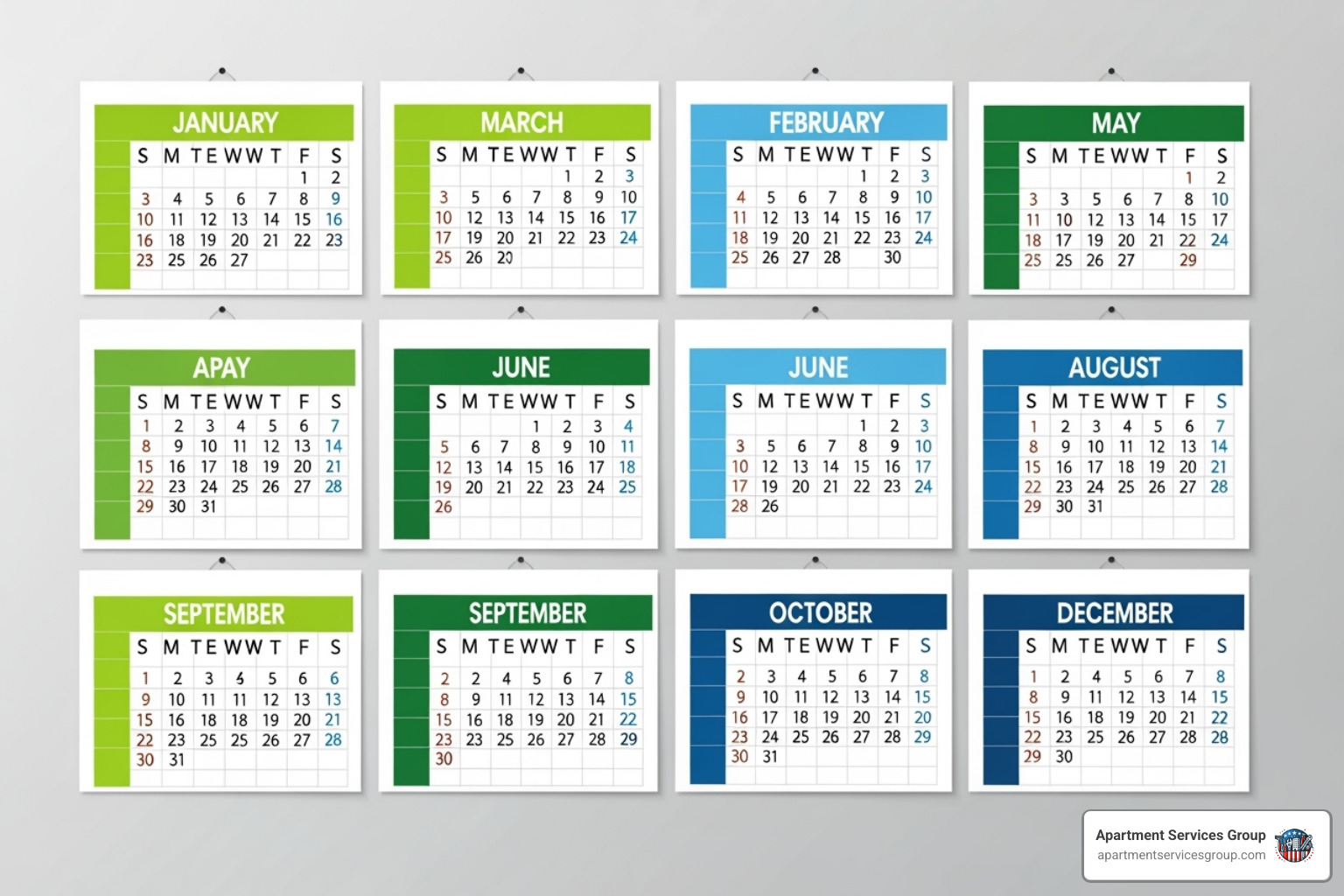
This schedule lets the city optimize their trucks and crews for different types of materials. During Tree Waste months, they’re set up for chipping and mulching. During Bulk Waste months, they’re ready to handle heavy furniture and appliances.
Here’s a helpful tip: while you can put Tree Waste out during Bulk Waste months, it won’t get the same treatment. To ensure your branches and yard debris actually get recycled instead of just tossed in a landfill, wait for the proper Tree Waste month or take it to a Neighborhood Depository Center yourself.
The city makes it easy to stay on track with their online schedule tool. Just enter your address and you’ll see exactly when your Houston bulk trash gets picked up, along with your regular garbage and recycling days.
Planning ahead is everything. When you know your schedule, you can time your cleanouts perfectly and avoid having piles of stuff sitting on your curb longer than necessary.
Guidelines and Restrictions for Houston Bulk Trash
Getting your Houston bulk trash picked up successfully isn’t just about putting it out there and hoping for the best. The city has specific rules that might seem picky at first, but they’re actually designed to keep everyone safe and ensure smooth collections. Think of it like a recipe – follow the instructions, and you’ll get great results every time.
Preparation and Placement Rules
Timing is everything when it comes to Houston bulk trash placement. You can put your items out starting at 6:00 p.m. the Friday before your collection day, but no later than 7:00 a.m. on collection day. This window prevents your old furniture from becoming a neighborhood eyesore or attracting unwanted visitors.
The city has an 8 cubic yard limit for each collection – that’s roughly the size of a minivan. If your pile looks like it could swallow a small car, you’ve probably gone overboard. For building materials from your own DIY projects, there’s a separate four cubic yard limit. But remember, this doesn’t include major construction debris like roofing materials or concrete.
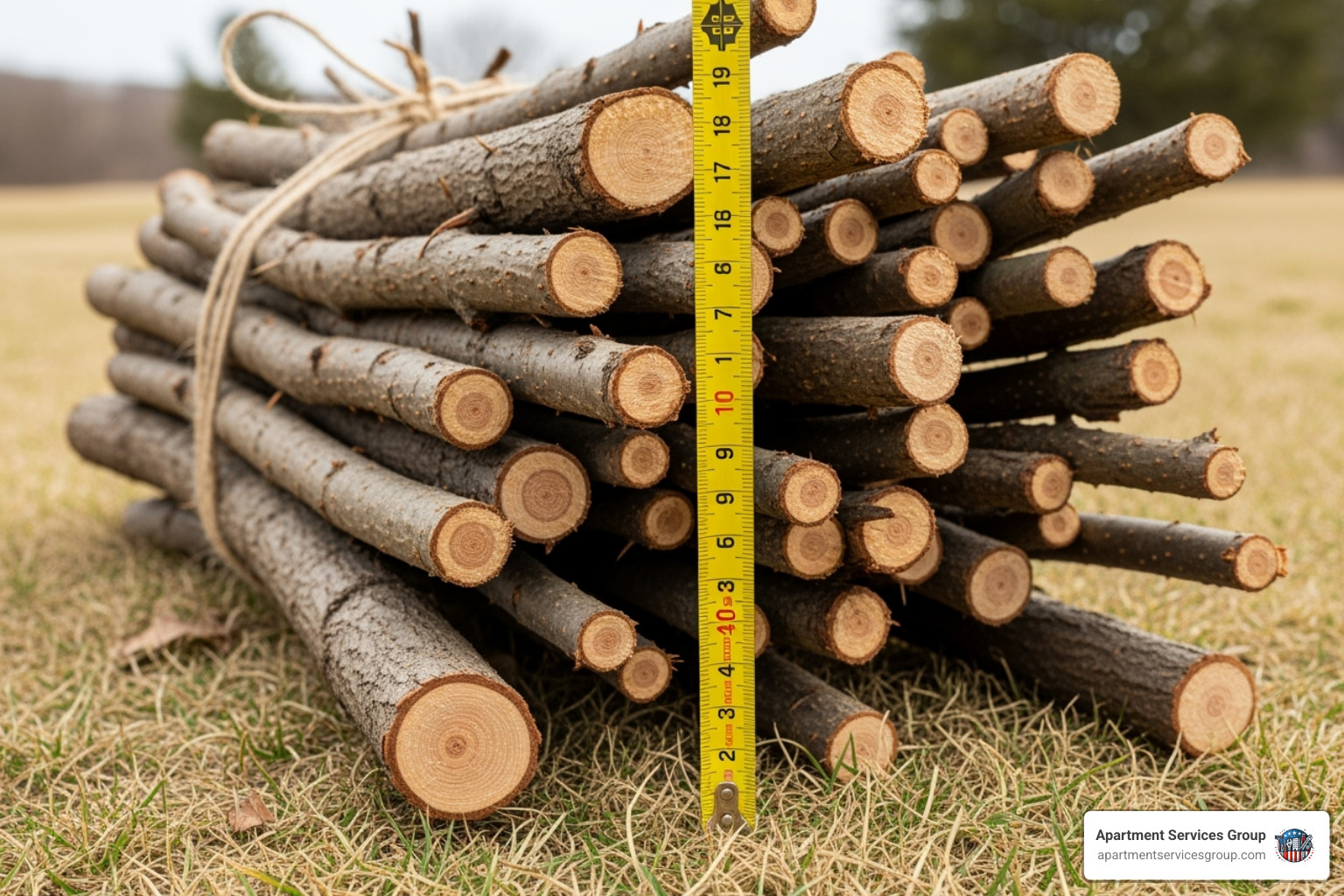
When it comes to placement, think safety first. Your items need to be easily accessible to collection trucks while avoiding utility meters like water meters, gas meters, and fire hydrants. Nobody wants a damaged utility line because someone stacked furniture on top of a meter.
Keeping streets clear is crucial too. Don’t place items in the street, on sidewalks, or where they’ll block pedestrian traffic. The collection crew needs clear access, and your neighbors need safe walkways.
For tree waste, bundling makes everyone’s life easier. Cut branches to manageable sizes – typically no longer than 4 feet and no more than 4 inches in diameter for smaller pieces. This helps the crews work efficiently and safely.
Following these simple rules helps maintain clean, attractive communities that residents are proud to call home. More info about clean communities shows just how much proper waste management impacts community appeal.
What’s NOT Accepted at the Curb?
Here’s where things get a bit tricky. The city won’t pick up everything, and mixing prohibited items with acceptable ones can result in your entire pile being left behind. It’s like one bad apple spoiling the bunch.
Contractor-generated debris is a big no. If you hired professionals for renovation work, they’re responsible for hauling away materials like roofing shingles, bricks, and concrete. The city’s bulk service is for residents, not contractors.
Hazardous waste is strictly forbidden and for good reason. Items like liquid paints, fuels, oils, pesticides, pool chemicals, and certain batteries contain dangerous chemicals that require special handling. For proper disposal of these materials, check out the Harris County facility at Disposing of hazardous materials.
Electronics like old TVs, computers, and printers aren’t accepted either. These items often contain hazardous materials and need specialized recycling. The same goes for automotive parts and excessive amounts of dirt or rocks that could damage collection equipment.
If your pile contains even one prohibited item, the entire collection might be refused. It’s worth double-checking your pile before collection day to avoid disappointment.
Special Item Disposal: Appliances and Tires
Some items need special treatment before they can join your Houston bulk trash pile. Appliances with refrigerants and tires are the main culprits here.
For appliance preparation, anything containing refrigerants – like refrigerators, freezers, and air conditioning units – requires refrigerant removal by a qualified technician before pickup. This isn’t just a city rule; it’s federal law designed to protect the ozone layer.
Once the refrigerant is removed, you’ll need a certified technician tag attached to the appliance. Without this tag, the city won’t touch it. So if you’re upgrading that old fridge, plan ahead and budget for this required service.
Tire disposal rules are more straightforward but still specific. The city accepts up to 4 tires during Bulk Waste months only (those even-numbered months). That’s enough for most household needs, whether you’re cleaning out the garage or replacing a set.
Don’t try putting tires out during Tree Waste months – they’ll sit there looking lonely until you move them back inside. The city processes tires separately, often recycling them into useful products, which is why they stick to this schedule.
These special requirements might seem like extra work, but they ensure responsible disposal and keep our communities looking their best while protecting the environment.
Beyond the Curb: Other Disposal Options
Life doesn’t always follow the neat schedule of Houston bulk trash collection. Sometimes you need to get rid of that old couch right now, or Mother Nature decides to redecorate your yard with fallen branches outside of the designated Tree Waste month. Don’t worry – you’ve got options beyond waiting for the next collection day.
Whether you’re dealing with storm cleanup, have items that don’t qualify for curbside pickup, or live in an area not directly serviced by the city, understanding these alternatives can save you time and headaches. As property managers, we’ve learned that having a backup plan keeps our communities looking their best year-round.
Navigating Storm Debris Collection
Houston storms don’t check the calendar before dropping tree limbs in your parking lot. When severe weather hits, suddenly everyone has urgent disposal needs, and the regular rules get a bit more flexible – but they don’t disappear entirely.
After a major storm, waste management crews focus on safety first. They prioritize clearing major roadways and collecting regular household trash first because that’s an immediate public health concern. Your storm debris, while important, typically comes second in line.
Post-storm priorities mean patience is key. The crews are working around the clock, but they’re dealing with an entire city’s worth of unexpected debris. Understanding this helps set realistic expectations for pickup times.
For storm-related tree debris, most of the regular bundling requirements still apply. Tree limbs should be cut to manageable lengths (typically 4 feet or less) and bundled so they’re not heavier than 40 pounds. This helps the collection crews work efficiently and safely, even when they’re dealing with much larger volumes than usual.
Many waste management companies offer special collection services for overwhelming amounts of storm debris. These are usually fee-based services that go beyond standard contracts. If your property looks like a lumber yard after a storm, it’s worth contacting your waste service provider with photos and your address for a quote on one-time collection.
The key is communication and understanding. Storm cleanup is challenging for everyone involved, and our crews work tirelessly to get communities back to normal. For more guidance on managing waste during difficult times, check out our Apartment Trash Service Tips.
Alternatives to Curbside Houston Bulk Trash Pickup
Sometimes curbside collection just won’t work for your situation. Maybe you missed your pickup window, have more than the 8-cubic-yard limit, or live in an area with different service arrangements. The good news is Houston has several alternatives that can solve your disposal puzzle.
Neighborhood Depository Centers are like the Swiss Army knife of waste disposal. The City of Houston operates several of these centers where residents can drop off bulk waste, tree waste, and recyclables at their own convenience. You simply load up your items, drive to the nearest center, and unload them yourself.
These centers accept the same types of bulk and tree waste as curbside collection, plus additional recyclables. You’ll need proof of Houston residency, but the flexibility is worth it. No more waiting for the “right” month or worrying about placement timing.
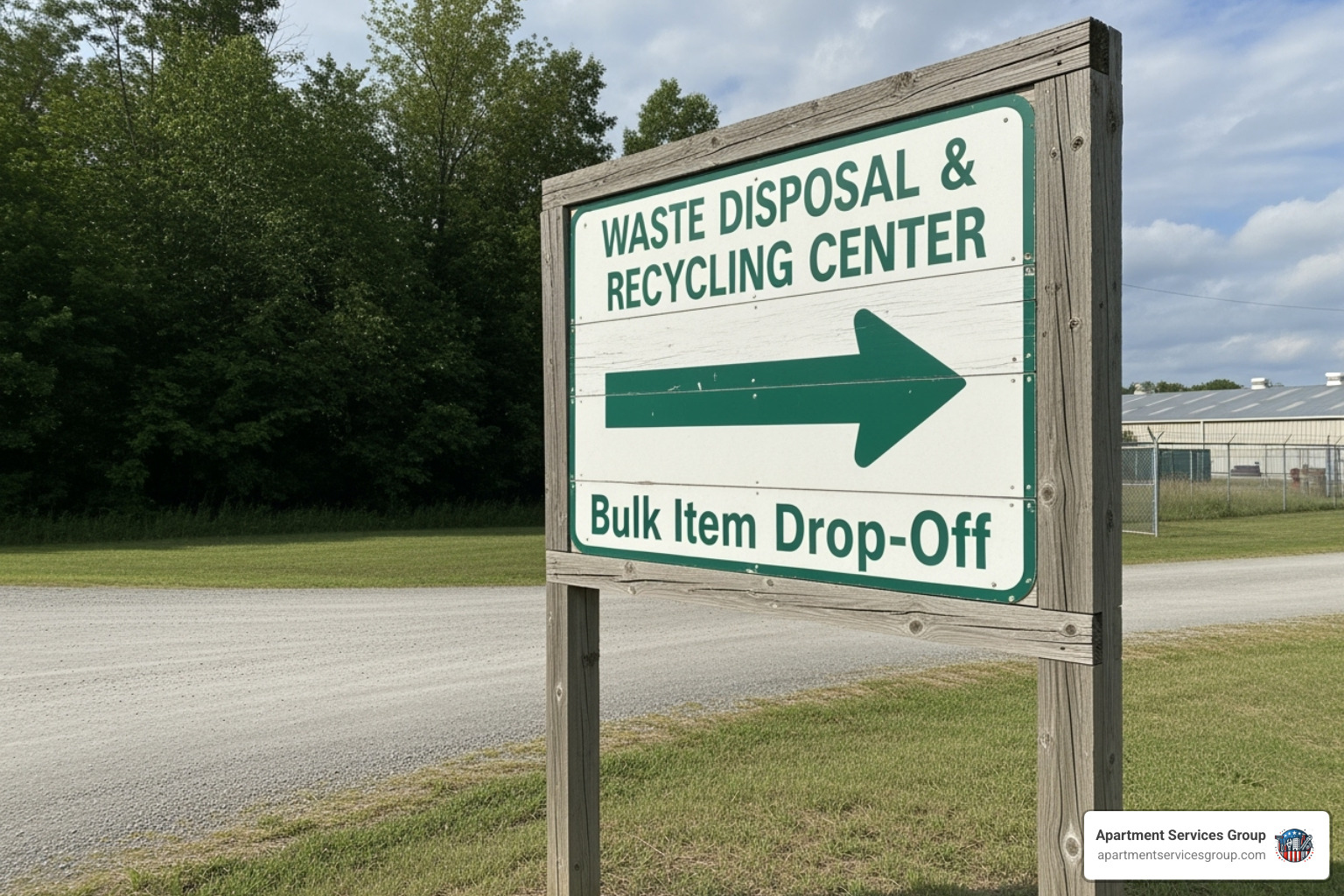
Unincorporated Harris County services offer another solution if you live outside the city limits. Harris County Precinct One, for example, runs a monthly heavy trash drop-off service at the Miller Road Service Center drop-off location. It’s available on the third Saturday of every month from 8 AM to 1 PM, and they accept items like old tires, furniture, mattresses, and even some construction materials like shingles and carpet.
Miller Road Service Center drop-off
The service typically allows one load per household per month, and trailers might not be permitted. It’s a great example of how different areas adapt waste services to meet local needs.
Municipal Utility Districts (MUDs) serve many areas within greater Houston, especially newer developments and areas outside direct city limits. These MUDs contract with private waste management companies to provide trash, recycling, and Houston bulk trash services.
Each MUD has its own specific rules and schedules. Some offer bulk trash collection once a month on a specific day, while others might allow a certain number of items per regular service day. The limits and preparation requirements can vary significantly – some might require eight items or fewer per collection, while others focus on bundling requirements for branches or nail removal for fencing.
For apartment complexes, understanding whether your property falls under city services, a MUD, or a private contract is the first step. We work with property managers to steer these different systems, ensuring residents have clear guidelines and proper disposal options that keep communities looking their best.
Frequently Asked Questions about Houston Bulk Trash
We know that even with all the guidelines, questions about Houston bulk trash can still leave you scratching your head. Trust me, after years of helping property managers steer these waters, I’ve heard just about every question imaginable. Let’s tackle the most common ones so you can feel confident about your next bulk trash day.
How do I find my exact bulk trash pickup day?
This is hands down the question we get asked most often! And honestly, it makes perfect sense. With Houston’s unique alternating schedule and different collection days throughout the city, it can feel like solving a puzzle just to figure out when to put your old couch on the curb.
The good news? The City of Houston has made this incredibly easy with their online tools. No more guessing games or trying to remember what your neighbor told you six months ago.
The City of Houston provides an interactive map and collection schedule lookup tool that’s honestly a game-changer. You simply enter your address, and it shows you everything you need to know – your specific dates for regular garbage pickup, recycling collection, Tree Waste months, and Bulk Waste months. It’s like having a personal waste management assistant right at your fingertips.
You can find this incredibly helpful tool on the Solid Waste Management Department’s website. I always tell property managers to bookmark this page and share it with their residents. It prevents so many headaches and confused calls to the office!
What if I have more than 8 cubic yards of trash?
Ah, the dreaded “pile too big” situation. We’ve all been there – you start cleaning out a storage room or helping a resident move out, and suddenly you’re looking at what appears to be a small mountain of furniture and belongings.
Here’s the reality: if your pile exceeds the 8-cubic-yard limit (remember, that’s roughly the size of a minivan), the city collection crews will take what fits within the limit and leave the rest behind. It’s not that they’re being difficult – they have specific truck capacities and schedule constraints to maintain.
When you find yourself with an oversized pile, you have several practical options. Breaking it down into smaller loads works well if you have time and can wait for the next collection cycle. Just remember that bulk waste only comes around once every two months, so this approach requires patience.
Taking excess items to a Neighborhood Depository is often your fastest solution. You’ll need to load everything yourself and make the trip, but these facilities accept the same types of items as curbside collection. Plus, you can go at your convenience rather than waiting for the next scheduled pickup.
For larger cleanouts or when time is critical, hiring a private removal service might be your best bet. These companies specialize in handling oversized loads and can often take items that the city won’t accept. While there’s a cost involved, the convenience and speed often make it worthwhile, especially for apartment communities dealing with move-out situations.
Are there special services for elderly residents or those with disabilities?
This question always warms my heart because it shows how much people care about ensuring everyone in our community has access to proper waste services. The answer is a resounding yes – Houston recognizes that not everyone can easily wrestle a heavy mattress to the curb or roll garbage carts down a long driveway.
The City of Houston’s Solid Waste Management Department offers special assistance programs specifically designed for residents who face physical challenges. These services can include help with regular garbage and recycling collection, and depending on the situation, may extend to bulk waste assistance as well.
The process involves filling out an application that helps the city understand your specific needs and limitations. They evaluate each situation individually to determine the appropriate level of assistance. Some residents might qualify for curbside pickup assistance, where crews will collect items from a more accessible location like near your front door or garage.
Contacting 3-1-1 is always your best first step. Houston’s city services helpline can walk you through the entire application process, explain eligibility requirements, and help you understand exactly what services are available. The staff there are incredibly knowledgeable and patient – they’re used to helping people steer these systems.
It’s worth noting that some private waste companies also offer similar assistance programs, so if you live in a MUD area, it’s worth asking your waste service provider about their options for residents who need extra help.
The key is not to struggle in silence. These programs exist because the city wants to ensure everyone has access to clean, safe waste disposal, regardless of physical limitations. Don’t hesitate to reach out and ask for the help you need.
Conclusion
Mastering Houston bulk trash collection doesn’t have to feel like solving a puzzle with missing pieces. Once you understand the system, it becomes second nature – like knowing which direction to drive on a one-way street.
The key is remembering the fundamentals: odd months for tree waste, even months for bulk items. Keep that 8-cubic-yard limit in mind (think minivan-sized pile), and always place items out between Friday evening and collection day morning. For appliances with refrigerants, get that certification tag first. For tires, remember the 4-tire limit during bulk waste months only.
When the standard curbside service doesn’t fit your needs, you’re not stuck. Neighborhood Depository Centers offer flexibility for drop-offs. If you live in a MUD area, your private hauler might have different schedules or rules. And for those times when you have more than the city can handle, private removal services can step in.
Planning ahead makes all the difference. Knowing your collection schedule prevents those frustrating moments when items sit at the curb longer than expected. Following the guidelines ensures pickup happens smoothly, keeping your property looking its best.
For us in the apartment industry, proper Houston bulk trash management directly impacts resident satisfaction and property appeal. Nothing hurts curb appeal quite like a pile of rejected bulk items sitting at the street. When residents understand the rules and have clear guidance, everyone wins.
The ripple effects go beyond just aesthetics. When we properly sort bulk waste from tree waste, we’re helping Houston divert materials from landfills. That tree waste gets turned into mulch instead of taking up landfill space. Those appliances get processed responsibly. It’s a small way we all contribute to keeping our city sustainable.
Managing resident move-outs and ongoing bulk waste needs can feel overwhelming for property managers. Between coordinating schedules, ensuring compliance, and handling resident questions, it’s a lot to juggle. That’s where streamlining all your property services becomes essential for both efficiency and resident satisfaction.
Apartment Services Group offers comprehensive apartment complex solutions to help manage everything from waste coordination to maintenance, ensuring your property remains pristine and your residents enjoy that seamless living experience they deserve.

